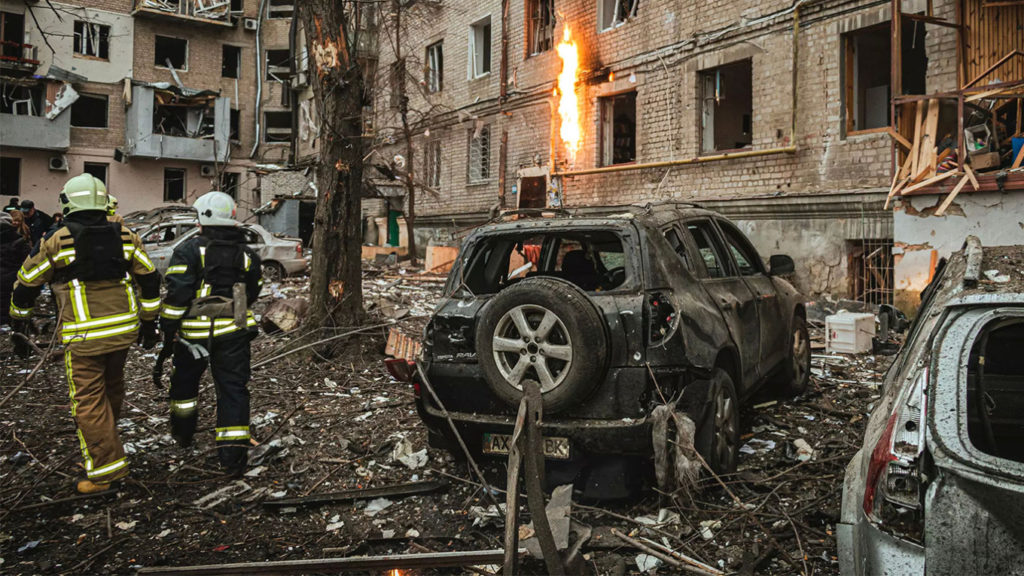It is a High Time the International Community to Take Decisive Action. In recent days, Russia has intensified its attacks on Ukraine, carrying one of the largest combined missile and drone attacks since the beginning of the full-scale invasion. On August 26, 2024, more than 230 air attack weapons, including missiles and drones, were launched.
Ukrainian Air Defense Forces managed to destroy 102 missiles and 99 drones, demonstrating their tenacity and dedication in defending the country. As usual, civilians were targeted: seven people were killed and about 50 were injured in the attacks, including four children.
Neighboring countries also felt the consequences of these attacks: Moldova experienced power outages, and a Russian kamikaze drone violated Polish airspace, demonstrating the scale of Russian aggression.
On the night of August 27, the Kremlin continued its massive strikes on Ukrainian territory, launching 10 missiles and 81 attack drones. Ukrainian Air Defense Forces were able to shoot down 5 missiles and about 60 drones, but some of them reached their targets, which led to tragic consequences. As a result of the shelling, 4 people were killed and more than 16 were injured. These attacks continue to demonstrate Russia’s desire to maximum damage Ukraine’s critical infrastructure and terrorize the civilian population.
These attacks have become some of the largest and most destructive since the beginning of the war. The strikes were launched against critical infrastructure, especially the fuel and energy sector, in many regions of the country. In particular, the Kyiv Hydroelectric Power Plant was hit, although there is no threat of a dam’s breach. The intensity of the attacks indicates not only an increase in military aggression, but also a deliberate attempt to paralyze vital infrastructure in Ukraine.
Russia are also attacking foreign journalists more frequently than before to intimidate and prevent them from covering the war in Ukraine. On the night of August 25, a Russian strike hit the Hotel Sapphire in Kramatorsk, killing Ryan Evans, a member of the Reuters team and leaving two other journalists in critical condition. The following night, a Russian missile struck the Hotel Aurora in Kryvyi Rih, killing two people and injuring five. These targeted attacks on media representatives are not only a violation of international law, but also Russia’s attempt to intimidate journalists and prevent them from reporting on the truth about the war in Ukraine.
In response to these intensified attacks and the increased threat to Ukraine’s allies, there have been growing calls for restrictions on the use of long-range weapons against Russian military targets to be lifted. On August 26, 2024, EU Foreign Minister Josep Borrell stressed the need to review the current restrictions on the use of Western weapons to strike military targets in Russia. In his statement, he noted that lifting these restrictions, within the framework of international law, would not only strengthen Ukraine’s ability to defend itself, but would also save many lives and reduce the destruction on its territory. Borrell added that Ukraine should have the right to use long-range weapons to defend itself against Russian aggression: “Lifting restrictions on the use of capabilities vs the Russian military involved in aggression against Ukraine would strengthen Ukrainian self defence, save lives and reduce destruction in Ukraine,” Josep Borrell said.
It is important to understand that Ukraine’s lack of long-range weapons puts it at a significant disadvantage, especially when the aggressor has no such restrictions. Expanding Ukraine’s capabilities is not an escalation of the conflict, but ensuring its right to protection and advancing peace. Russia’s recent attacks have shown that it has no “red lines” and is ready to take any measures to achieve its goals. Strengthening Ukraine’s defensive capabilities is essential to deter further aggression and protect not only Ukraine, but also the stability of Europe and the world.
The international community cannot stand aside from Russia’s ongoing aggression and its blatant violation of international norms. Recent attacks on Ukraine’s critical infrastructure and targeted attacks on foreign journalists highlight the need for a strong international response. The world cannot stand by while Russia violates the sovereignty of its neighbors and commits acts that may be classified as crimes against humanity. The use of long-range weapons to strike Russian military bases and airfields must be seen as a legitimate means of defense against an aggressor that has no respect for international borders or human life.
Russia’s recent actions are a reminder of President Vladimir Putin’s fierce ambitions and imperial goals. Inaction is no longer an option, as Russia would not stop at Ukraine. It is vital the international community to respond decisively, support Ukraine in its right to defend itself, and ensure compliance with global peace and security norms. The costs of inaction are too high; the world must act now to prevent further escalation and hold Russia accountable for its actions.

